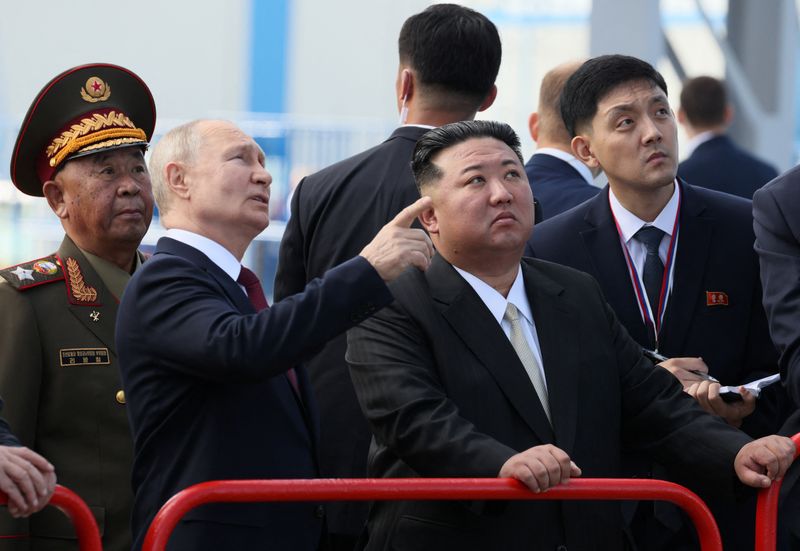SEOUL (Reuters) - North Korean leader Kim Jong Un on Wednesday toured Russia's most modern space launch centre, where President Vladimir Putin promised to help Pyongyang build satellites.
The unprecedented visit comes as North Korea seeks to put its first spy satellite into orbit, an effort that has seen two failed attempts this year.
The promised Russian aid comes as North Korea's scientists have vowed to try another launch of the new Chollima-1 booster in October.
Here's what we know about North Korea's race for space, why it's so controversial, and how Russia might help:
WHY DOES NORTH KOREA WANT A SATELLITE?
Since 1998 North Korea has launched six satellites, two of which appeared to have been successfully placed in orbit.
In 2015, a senior North Korean space official said the country wanted to develop cooperation with Russia on "peaceful" use of outer space, the official told TASS.
The most recent successful satellite launch was in 2016. International observers said that satellite seemed to be under control, but there was lingering debate over whether it had sent any transmissions.
Another senior official at North Korea's space agency said after the 2016 launch that it planned to put more advanced satellites into orbit by 2020 and eventually "plant the flag of (North Korea) on the moon".
During a party congress in January 2021, Kim revealed a wish list that included developing military reconnaissance satellites.
The Chollima-1 seems to be a new design and most likely uses the dual-nozzle liquid-fuelled engines developed for Pyongyang’s Hwasong-15 ICBM, which has roots in Soviet designs, analysts said.
South Korea has recovered some of the Chollima-1 wreckage - including, for the first time, parts of a satellite.
Seoul said the satellite had little military value, though analysts said any working satellite in space would provide North Korea with better intelligence on its enemies.
"To the best of our knowledge, North Korea has a very limited capacity to building satellites," said Brian Weeden of the Secure World Foundation, a U.S.-based space policy and security organisation. "None of them appeared to have any significant capability."
WHY ARE NORTH KOREA'S SATELLITES SO CONTROVERSIAL?
The United States and its allies called North Korea's latest satellite tests clear violations of United Nations Security Council resolutions, which prohibit development of technology applicable to North Korea's ballistic missile programs.
United Nations resolutions - passed with Russia's support - also ban any scientific and technical cooperation with North Korea in nuclear science and technology, aerospace and aeronautical engineering and technology, or advanced manufacturing production techniques and methods.
North Korea has said its space program and defence activities are its sovereign right.
At the time of the 2016 space launch, North Korea had yet to fire an intercontinental ballistic missile (ICBM). The satellite launch was condemned by governments in the United States and South Korea as a disguised test of missile technology capable of striking the continental United States.
Since 2016, North Korea has developed and launched three types of ICBMs, and now appears committed to placing working satellites in space. That would not only provide it with better intelligence on its enemies, but prove it could keep up with other growing space powers in the region, analysts said.
Putin's comments before meeting Kim at Vostochny Cosmodrome may suggest Russia will seek to teach North Korea how to build satellites, rather than building them for North Korea, said Lee Choon Geun of South Korea's Science and Technology Policy Institute.

It is unlikely that Russia can launch a satellite on North Korea's behalf, but if it does so, that violates UN restrictions, Lee said.
"Any form of satellite technology transfers or coordination between Russia and North Korea could be against international sanctions," he said. "There is no workaround."